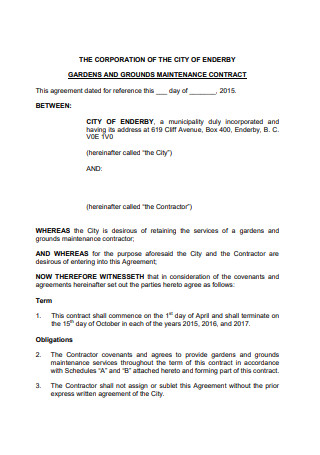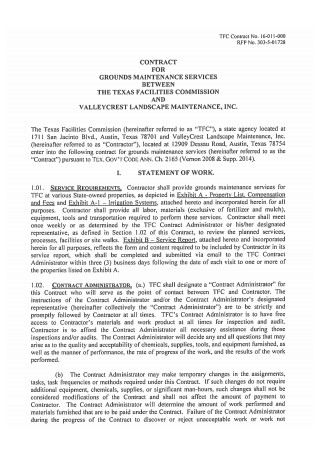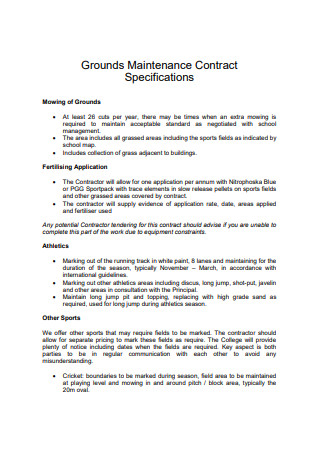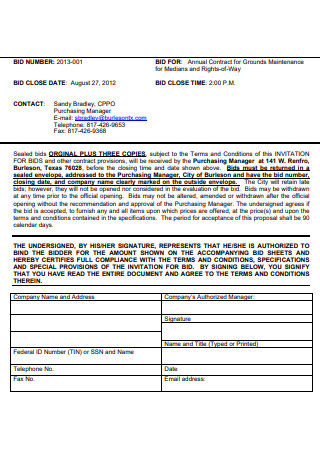4+ Sample Grounds Maintenance Contract
FREE Grounds Maintenance Contract s to Download
4+ Sample Grounds Maintenance Contract
What Is Grounds Maintenance?
Benefits of Grounds Maintenance
How to Keep Your Garden Healthy
FAQs
What are the duties of a groundskeeper?
What does it mean to maintain a park’s grounds?
What skills do you need to be a landscaper?
What Is Grounds Maintenance?
The term “grounds maintenance” refers to keeping outside spaces clean, beautiful, and organized. It involves activities like trimming, mowing, and landscaping. The time also applies to indoor gardens, nurseries, and container plants. The purpose of grounds upkeep is to enhance the visual appeal of landscaping elements. Landscaping is the construction of visually acceptable outdoor extensions of indoor living spaces. Property owners emphasize grounds upkeep to increase resident morale, recruit and retain business, and protect their investments. Both residential and commercial property owners employ grounds maintenance to boost perceived property values, resulting in higher selling prices. Employment of groundskeepers is anticipated to increase by 5 percent from 2021 to 2031, as fast as the average for all occupations. Over the next ten years, an average of 179,600 job positions for groundskeepers are expected to arise annually. Many of these opportunities are anticipated to be the consequence of replacing people who switch occupations or leave the labor force, such as when they retire.
Benefits of Grounds Maintenance
Ground maintenance is one of the most effective methods for keeping your outdoor areas neat and clean. Whether it is pruning, landscaping, or mowing, grounds management is crucial in ensuring that the exterior space looks its best. In addition to enhancing the visual appeal, grounds maintenance is essential for numerous other reasons. As a business owner, you must attend to your enterprise’s physical and logistical sides. Inadvertent neglect of grounds upkeep is common; consequently, hiring commercial landscape experts allows you to maintain the appearance of your building. If you remain unconvinced of the significance of grounds upkeep, the additional advantages listed below will most likely change your mind.
How to Keep Your Garden Healthy
When a plant is plagued with a disease, one of the most perplexing things that may occur in a garden is one of the most mysterious occurrences. How did it happen? Will it grow? Will my plants perish? How can I eliminate it? The illness triangle is an essential concept to comprehend regarding disease prevention. If any of these factors are absent, the disease will not occur; hence, disease prevention requires eliminating at least one side of the triangle. Instead of waiting for a problem to arise in your garden, the best defense against illness is a proactive approach. The following are five techniques to eradicate at least one side of the disorder triangle and maintain healthy plants.
1. Examine plants thoroughly prior to purchase
The simplest method to reduce disease in your garden is to prevent its introduction. Getting a condition and a new plant is hardly a perk anyone desires. One of the challenging things to understand is the appearance of a healthy plant, making it tough to determine if the one you desire is sick. It is a good idea to gather a few books, periodicals, and catalogs that depict the appearance of a healthy specimen. Do not bring home a plant with insects, rotten stems, or dead patches. These issues can quickly spread to your healthy plants and can be difficult to eradicate once established. Continually assess the quality of the roots in addition to the plant’s foliage. It is uncommon to observe clients accomplishing this in a garden, but it should be the norm. Place your hand on the soil’s surface while holding the plant stem between your fingers. Invert the container and shake the plant to dislodge it. You may need to tap the pot’s edge against a firm surface to release the roots from the pool. Roots should be dense, typically white, and evenly dispersed throughout the root ball. Roots that are dark or mushy are not a good sign. Even if the tips of a plant appear to be healthy, it is just a matter of duration before a rotting root system kills it.
2. Utilize only fully composted yard debris
Not all items decay at the same rate in a compost pile. Some materials may have rotted enough to be placed in the park, while others have not. Intensive composting generates high temperatures for extended durations, eliminating microorganisms in the material. Infected plant detritus that has not passed this process will reinfect your garden with potential diseases. Suppose you are uncertain about the state of your compost pile. In that case, you should avoid utilizing yard waste as mulch under delicate plants and avoid adding potentially contaminated garbage to the pile.
3. Keep an eye on your bugs
Insect harm to plants goes far beyond just aesthetics. Viruses and bacteria can typically only enter a plant through an opening created by insect damage. Viruses are transmitted from one plant to the next by certain insects that serve as vectors. Aphids are one of the most prevalent vectors. Thrips are responsible for transmitting impatiens necrotic spot virus, which has become a significant issue for commercial producers during the past decade. The disease Aster yellows (shown on the right) is transmitted by leafhoppers and has a wide variety of host plants. Insect attacks also stress a plant, decreasing its disease resistance.
4. Clean up in the fall
Even in a temperate area, the best time to clean up the garden is in the fall. This is an excellent disease-preventative and innovative approach to managing diseases that have already taken hold in your garden. On dead leaves and debris, diseases can overwinter and then attack the young leaves that sprout in the spring. Conditions such as iris leaf spots, daylily leaf streaks, and black spots on roses can be drastically decreased if dead leaves are removed each fall. If you leave stems and foliage for winter interest, remove them before the onset of new growth in the spring.
5. Apply the correct fertilizer
When fertilizing plants, you need to be careful because too much fertilizer can burn the roots, making them less able to take in water. This makes the plants more sensitive to drought, cold, and heat stress. When plants don’t get enough nutrients, they get smaller and are more likely to get leaf spots. A more vigorous plant, on the other hand, can fight off diseases. A plant can also be stressed by having too many specific nutrients. A soil test from your local extension service will give you accurate information about the levels of nutrients in your soil. Without it, you’ll probably guess when you feed your plants, which could give them too much of one nutrient or not enough of another.
FAQs
What are the duties of a groundskeeper?
The duties of groundskeepers include mowing grass, trimming hedges and bushes, removing dead plants, landscaping gardens, and monitoring plant health. They also ensure outdoor spaces’ safety, functionality, and aesthetic appeal. Groundskeepers must be physically fit to operate heavy machinery, stand for extended periods, and lift ample supplies.
What does it mean to maintain a park’s grounds?
Performing maintenance tasks such as mowing grass, cutting trees, spraying pesticides, and keeping parks clean, safe, and operationally effective. Sprinklers, tree trimmers, lawnmowers, shears, rakes, clippers, and chainsaws are used to maintain gardens.
What skills do you need to be a landscaper?
The ability to operate tools like lawnmowers and hedge trimmers, good physical fitness, organization skills, and attention to detail are all prerequisites. The ability to deal with trees, flowers, rocks, gazebos, benches, and outdoor tables is another skill that landscapers must possess.
Essential for preserving the aesthetic appeal of a facility’s exterior setting is grounds management. Consistent maintenance is required to prevent outdoor spaces from becoming unsightly or hazardous. While few formal qualifications are necessary for ground maintenance work, there is professional training that individuals can exploit to advance their careers.





